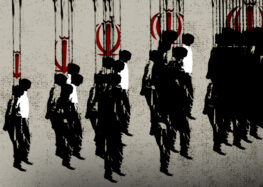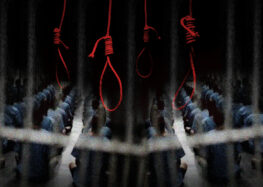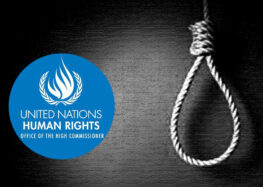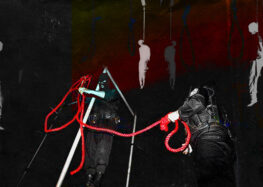Secret Group Executions Continue at Vakilabad; Dozens More Executed In April and May
Though Iranian judicial authorities continue to stay silent about the execution of prisoners with drug-trafficking charges inside Mashad’s Vakilabad Prison and refuse to acknowledge the executions or related statistics, informed sources tell the International Campaign for Human Rights in Iran that more than 70 individuals were hanged inside this prison in March, April, and May. The executions have taken place weekly and in groups. Despite limitations on disseminating information from inside the prison and other sources, Campaign sources have confirmed 70 executions inside the Mashad facility.
According to these sources, widespread executions in Vakilabad have taken place secretly and in groups. The last time the executions took place was on Monday, 16 May, when 10 prisoners were hanged. All those executed were convicted on charges of transport, possession, sale, and purchase of drugs. Like previous executions, the most recent ones were carried out without informing the families and lawyers of the prisoners and without even informing the prisoners themselves.
The sources told the Campaign that the executions were carried out without receiving confirmation papers from the Supreme Court that conveyed the appeals courts’ decision to uphold the lower courts’ rulings. Seemingly, the Mashad Prosecutor is carrying out the executions without following legal procedure. Prior to the recent executions, the Campaign was last informed about another group of 10 executions on 1 March. (Link)
In his March report, UN Secretary General Ban Ki-moon wrote that during a meeting between the staff of the UN High Commissioner on Human Rights and their Iranian counterparts, the Iranian team confirmed 60 executions at the Vakilabad facility. The same authorities have so far not presented any statistics about the actual number of executions in this prison.
The International Campaign for Human Rights in Iran has repeatedly asked Iranian authorities to act transparently and with accountability in terms of executions that continue to take place inside Iran’s different prisons. There is concern that the Iranian judicial authorities implementing death sentences on a widespread scale in order to empty prisons of the hundreds of inmates who have been sentenced to death over the past years. In many cases, the judicial review of the charges and other legal and judicial steps required for the implementation of the death sentences have been fraught with problems. Iran ranks second only to China in executions, though China recently imposed a 2-year moratorium executions. Considering Iran’s population, Iran has more per capita executions than China.
According to the sources, the group executions at Vakilabad Prison are carried out in the hallway leading to the facility’s visitation hall. Usually the convicts are collected from their different wards, and taken to Ward 6/1 for their pre-execution Islamic ablution ritual and for writing their last will. They are then transferred to the execution hallway. Most of the death row inmates are kept inside Halls 101, 102, 103, 104, and 105 of Ward 5 at Vakilabad Prison.
In the death certificates issued for the inmates, their cause of death is written as “legal murder.” A government employee who was present during the executions told the Campaign: “In order to expedite the administrative process, the death certificates of the prisoners who are to be executed inside Vakilabad Prison are issued several hours prior to the executions and while the prisoner is still alive.” Issuing death sentences for individuals who are still alive is illegal, especially as according to Sharia and Iranian laws, if an individual survives the hanging after a certain time he or she is free and cannot be further prosecuted.
In addition to Campaign sources who report secret executions from judicial and governmental organizations and Vakilabad Prison, many other witnesses have spoken about the executions as well. Ahmad Ghabel, a theological researcher and a student of Ayatollah Montazeri who was twice imprisoned at Vakilabad, has spoken publicly about widespread, unannounced executions inside the facility.
In an interview with the Campaign, Ghabel reported the executions of 50 prisoners, convicted of crimes related to drug trafficking, during his first imprisonment at Vakilabad between March and May 2010. During his second imprisonment at Vakilabad in the Fall of 2010, Ghabel reported the continuation of secret group executions in the prison. In his media interviews, he said that about 60 prisoners were executed during that time.
In a letter to the Head of the Judiciary, Hashem Khastar, another prisoner of conscience inside Vakilabad, reported widespread, unannounced, and secret executions. Khaster spoke of the executions of 63 inmates in just one day on 10 August 2010.
The nephew of one of the inmates executed on 18 August 2010 said that 67 prisoners were executed in just that day. He claimed his uncle’s judicial review process was not fair and that the uncle’s possession of 300 grams of drugs, which led to his uncle’s execution, belonged to one of his uncle’s friends, not him.
Several prisoners with drug trafficking charges have stated that they were denied a fair judicial process and in many cases Mashad judges have issued death sentences without sufficient evidence and only based on the suspects’ confessions, which were extracted under duress and torture.
The International Campaign for Human Rights in Iran completely and generally opposes the death penalty, because of its irreversible nature. The Campaign believes that the unannounced executions which are not confirmed by Iranian officials are also taking place inside other prisons in Iran and asks the Iranian authorities again to be accountable and transparent about the said executions.






